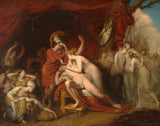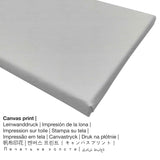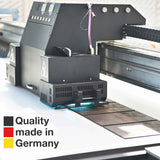George Dawe, 1803 - Achilles, frantic for the loss of Patroclus, rejecting the consolation of Thetis - fine art print
Tax included. Shipping calculated at checkout.
General specifications by the museum (© Copyright - Museum of New Zealand - Te Papa Tongarewa - www.tepapa.govt.nz)
Achilles, frantic for the loss of Patroclus, rejecting the consolation of Thetis, 1803, United Kingdom, by George Dawe. Gift of the New Zealand Academy of Fine Arts, 1936. Te Papa (1936-0012-83)
Background data on the unique work of art
| Title of the piece of art: | "Achilles, frantic for the loss of Patroclus, rejecting the consolation of Thetis" |
| Artwork classification: | painting |
| Art classification: | modern art |
| Period: | 19th century |
| Created in: | 1803 |
| Age of artwork: | over 210 years old |
| Original medium of artwork: | oil on canvas |
| Original artwork size: | Image: 1289mm (width), 1022mm (height) |
| Exhibited in: | Museum of New Zealand - Te Papa Tongarewa |
| Location of museum: | Te Aro, Wellington, New Zealand |
| Available at: | www.tepapa.govt.nz |
| License type: | public domain |
| Courtesy of: | Achilles, frantic for the loss of Patroclus, rejecting the consolation of Thetis, 1803, by George Dawe. Gift of the New Zealand Academy of Fine Arts, 1936. Te Papa (1936-0012-83) |
| Creditline: | Gift of the New Zealand Academy of Fine Arts, 1936 |
Artist details
| Artist name: | George Dawe |
| Additional names: | George Dawe, [Dawe], Dawe, Dawe George |
| Artist gender: | male |
| Nationality: | British |
| Jobs of the artist: | painter |
| Country of origin: | the United Kingdom |
| Artist category: | modern artist |
| Art styles: | Romanticism |
| Life span: | 48 years |
| Born in the year: | 1781 |
| Hometown: | London, Greater London, England, United Kingdom |
| Year died: | 1829 |
| Deceased in (place): | Kentish Town, London, Greater London, England, United Kingdom, neighborhood |
About this product
| Print categorization: | wall art |
| Reproduction: | digital reproduction |
| Manufacturing method: | digital printing (UV direct print) |
| Manufacturing: | German production |
| Stock type: | on demand production |
| Proposed product use: | home décor, wall art |
| Alignment of the artwork: | landscape format |
| Side ratio: | 1.2 : 1 (length : width) |
| Implication: | the length is 20% longer than the width |
| Materials you can select: | poster print (canvas paper), canvas print, acrylic glass print (with real glass coating), metal print (aluminium dibond) |
| Canvas on stretcher frame (canvas print) options: | 60x50cm - 24x20", 120x100cm - 47x39", 180x150cm - 71x59" |
| Acrylic glass print (with real glass coating) sizes: | 60x50cm - 24x20", 120x100cm - 47x39", 180x150cm - 71x59" |
| Poster print (canvas paper) options: | 60x50cm - 24x20", 120x100cm - 47x39" |
| Dibond print (alumnium material) size options: | 60x50cm - 24x20", 120x100cm - 47x39" |
| Frame: | not included |
Materials our customers can pick
We offer a range of different materials and sizes for every product. The following sizes and materials are the options we offer you for individualization:
- Poster print (canvas material): A poster is a UV printed sheet of canvas paper with a slightly roughened surface structure, that resembles the original artwork. Please keep in mind, that depending on the size of the canvas poster print we add a white margin of something between 2-6 cm around the artwork in order to facilitate the framing with your custom frame.
- Acrylic glass print (with real glass coating): A glossy acrylic glass print, often named a print on plexiglass, will change an original into brilliant décor and offers a viable alternative to dibond and canvas fine art replicas. Your work of art will be manufactured with the help of modern UV print machines. The major upside of a plexiglass print is that contrasts and minor image details will be recognizeable thanks to the delicate gradation.
- The canvas print: A UV printed canvas applied on a wood frame. Additionally, a canvas print makes a cosy, pleasing effect. Canvas Prints have the advantage of being low in weight, meaning that it is easy to hang the Canvas print without extra wall-mounts. A canvas print is suited for all types of walls.
- Aluminium dibond print: Aluminium Dibond prints are metal prints with an outstanding depth effect, which creates a fashionable look with a non-reflective surface structure. A direct Aluminium Dibond Print is the excellent start to fine reproductions produced with aluminum. The bright & white parts of the original work of art shine with a silk gloss, however without any glare. Colors are luminous in the highest definition, the fine details of the print are crisp and clear.
Summarization of the replica
This work of art was painted by George Dawe in 1803. The painting measures the size: Image: 1289mm (width), 1022mm (height) and was painted with oil on canvas. This work of art belongs to the digital art collection of Museum of New Zealand - Te Papa Tongarewa, which is the national museum of New Zealand, with a great collection of artworks that contain deep ancestral links to the indigenous Māori population of New Zealand. With courtesy of: Achilles, frantic for the loss of Patroclus, rejecting the consolation of Thetis, 1803, by George Dawe. Gift of the New Zealand Academy of Fine Arts, 1936. Te Papa (1936-0012-83) (licensed: public domain). Creditline of the artwork: Gift of the New Zealand Academy of Fine Arts, 1936. On top of that, alignment is in landscape format and has a side ratio of 1.2 : 1, which means that the length is 20% longer than the width. George Dawe was a painter from the United Kingdom, whose artistic style can primarily be attributed to Romanticism. The European artist lived for 48 years - born in 1781 in London, Greater London, England, United Kingdom and deceased in 1829 in Kentish Town, London, Greater London, England, United Kingdom, neighborhood.
Important information: We try to depict our products as exact as possible and to showcase them visually in our shop. Still, some pigments of the printed materials, as well as the print result might vary to a certain extent from the representation on the monitor. Depending on your screen settings and the nature of the surface, color pigments can unfortunately not be printed one hundret percent realistically. Because all the fine art prints are processed and printed manually, there may as well be minor discrepancies in the exact position and the size of the motif.
© Copyright | Artprinta (www.artprinta.com)














